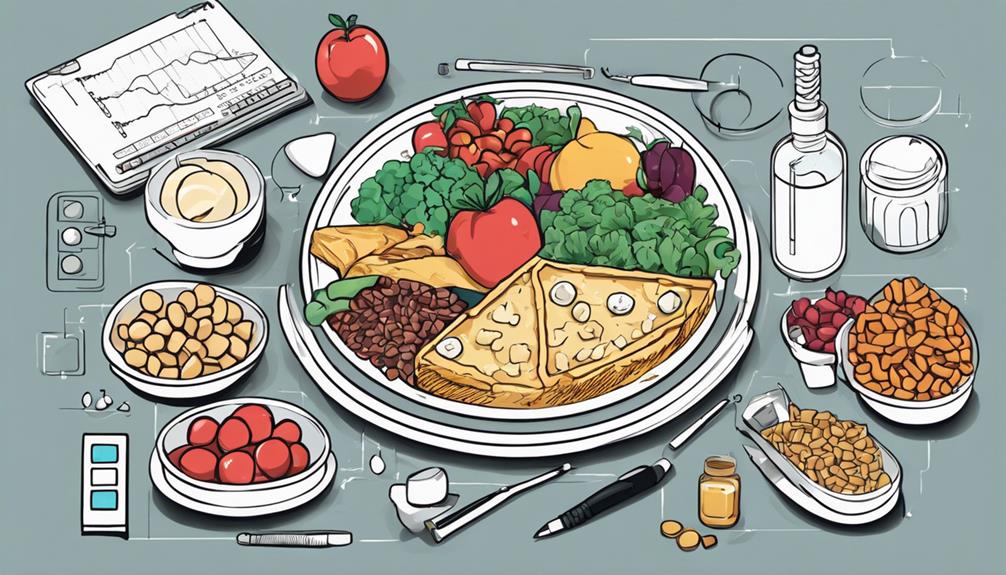When it comes to managing your diet with type 1 diabetes, it's like navigating a complex maze with precise steps to take at every turn. Your food choices can greatly impact your blood sugar levels, influencing how you feel each day.
From carbohydrate counting to monitoring the glycemic index of foods, each aspect plays a crucial role in maintaining your health. But what about those hidden factors that could be affecting your diet without you even realizing it?
Let's uncover the lesser-known ways this condition can shape your eating habits.
Key Takeaways
- Carbohydrate counting and portion control are vital for blood sugar management.
- Insulin doses must align with meal carbs and lifestyle changes.
- Regular blood sugar monitoring guides dietary adjustments for control.
- Sugar intake needs strict limitation with substitutes and carb management.
Carbohydrate Counting

Have you ever wondered how carbohydrate counting can impact your diet when managing Type 1 diabetes? Carbohydrate counting is a crucial aspect of managing blood sugar levels effectively. By keeping track of the amount of carbohydrates you consume, you can better control your blood glucose levels. Portion control plays a significant role in this process. Understanding the carbohydrate content of different foods allows you to make informed decisions about portion sizes, helping you maintain stable blood sugar levels throughout the day.
Additionally, meal frequency is essential when considering carbohydrate counting. Spacing out your meals and snacks evenly can prevent drastic spikes or drops in blood sugar. This approach helps in managing diabetes effectively. When planning your meals, fiber intake should also be a priority. Foods high in fiber can help slow down the absorption of carbohydrates, leading to better blood sugar control.
Furthermore, considering sugar substitutes can offer a way to satisfy your sweet tooth without causing significant fluctuations in blood glucose levels. By incorporating these strategies into your carbohydrate counting regimen, you can take control of your diet and effectively manage Type 1 diabetes.
Insulin Management
When managing your insulin for Type 1 diabetes, adjusting your dosage is crucial to maintain stable blood sugar levels throughout the day. Regular blood sugar monitoring helps you track how your body responds to insulin, enabling you to make necessary adjustments.
Meal planning strategies play a key role in coordinating your insulin doses with your carbohydrate intake to keep your blood sugar in check.
Insulin Dosage Adjustment
Adjusting your insulin dosage is a crucial aspect of managing type 1 diabetes effectively. Daily routines and lifestyle changes greatly impact how much insulin your body needs.
Factors such as exercise, stress levels, and food intake can all influence your insulin requirements. It's essential to work closely with your healthcare team to determine the right insulin doses for you.
Keeping a detailed log of your blood sugar levels, food intake, and activities can help identify patterns that may require adjustments in your insulin regimen.
Understanding how these variables affect your blood sugar levels is key to fine-tuning your insulin dosage and maintaining optimal control over your diabetes. Remember, regular communication with your healthcare provider is vital for successful insulin management.
Blood Sugar Monitoring
Monitoring your blood sugar levels is a critical component of effective insulin management in type 1 diabetes. To help you navigate glucose fluctuations and make necessary dietary adjustments, consider the following tips:
- Frequent Testing: Check your blood sugar regularly, especially before and after meals, and keep a log to track patterns.
- Understanding Target Range: Know your target blood sugar range and work with your healthcare provider to set personalized goals.
- Adjusting Insulin Doses: Use the data from your blood sugar monitoring to adjust your insulin doses accordingly.
- Seeking Professional Guidance: Consult your healthcare team for advice on managing blood sugar levels and making dietary changes tailored to your needs.
Meal Planning Strategies
To optimize insulin management in type 1 diabetes, efficient meal planning strategies are essential for stabilizing blood sugar levels. Portion control is crucial for managing blood glucose levels effectively. By keeping track of the amount of carbohydrates consumed at each meal, you can better adjust your insulin doses to match your body's needs.
Recipe modification is another valuable tool, as it allows you to adapt your favorite dishes to be more diabetes-friendly. Mindful eating plays a significant role in managing blood sugar levels as well. Being present and attentive while eating can help you recognize when you're full, preventing overeating.
Additionally, food substitutions can be made to lower the glycemic index of your meals, promoting better blood sugar control.
Balancing Blood Sugar Levels
Balancing blood sugar levels is crucial for individuals managing Type 1 diabetes to maintain stable energy levels throughout the day. To achieve this, consider the following strategies:
- Glycemic Control: Focus on consuming foods that have a lower impact on blood sugar levels to prevent spikes and crashes.
- Nutrient Balance: Ensure your meals are well-rounded with a mix of carbohydrates, proteins, and healthy fats to support overall health and stabilize blood sugar.
- Meal Timing: Spread your meals and snacks evenly throughout the day to avoid prolonged periods without eating, which can lead to fluctuations in blood glucose levels.
- Portion Control: Pay attention to portion sizes to regulate carbohydrate intake, as this directly impacts blood sugar levels. Monitoring portions can help maintain glycemic control and prevent unexpected spikes.
Meal Timing

Maintaining consistent meal timing plays a crucial role in managing blood sugar levels for individuals with Type 1 diabetes. By eating at regular intervals, you can help stabilize your blood sugar and avoid extreme highs and lows. Focus on portion control to ensure you're not consuming too many carbohydrates at once, which can lead to spikes in blood sugar levels. Additionally, meal frequency is key – aim to eat smaller meals throughout the day rather than a few large ones to help keep your blood sugar levels steady.
Considering glycemic response is essential when planning your meals. Opt for foods with a lower glycemic index to prevent rapid increases in blood sugar levels. Meal composition is equally important; include a balance of carbohydrates, proteins, and fats to help manage your blood sugar effectively. Remember to consult with a healthcare provider or a dietitian to tailor your meal timing and composition to your specific needs and lifestyle.
Snack Planning
When managing Type 1 Diabetes, snack planning plays a crucial role in maintaining stable blood sugar levels throughout the day.
Opt for healthy snack options like fruits, nuts, or yogurt to keep your energy levels steady and avoid sudden spikes or drops.
Monitoring your carbohydrate intake during snack time is essential for controlling blood glucose levels effectively.
Healthy Snack Options
To enhance your diet and manage Type 1 Diabetes effectively, consider incorporating nutrient-dense options for your snacks. When choosing snacks, opt for nutrient-rich options that provide sustained energy levels and help maintain blood sugar levels.
Here are some healthy snack choices:
- A small handful of nuts or seeds for a balanced choice rich in healthy fats and proteins.
- Greek yogurt with berries for a satisfying snack packed with protein and fiber.
- Carrot sticks with hummus for a crunchy and energy-boosting option.
- Apple slices with a sprinkle of cinnamon for a sweet treat that won't spike your blood sugar levels.
These snack options aren't only delicious but also support your overall health and diabetes management goals.
Monitoring Carbohydrate Intake
Monitoring carbohydrate intake is crucial for effective snack planning when managing Type 1 Diabetes. Portion control plays a significant role in keeping blood sugar levels stable.
Opt for snacks with a low glycemic index to prevent rapid spikes. Consider incorporating high-fiber foods like vegetables, fruits, and whole grains to slow down carbohydrate absorption and promote better blood sugar management.
Additionally, explore sugar substitutes like stevia or erythritol to sweeten snacks without causing drastic glucose fluctuations. Reading nutrition labels and calculating carbohydrate content accurately is essential for making informed snack choices.
Monitoring Glycemic Index

Maintaining awareness of the glycemic index can be crucial for individuals managing type 1 diabetes and their dietary choices. The glycemic index ranks carbohydrates based on how they affect blood sugar levels. Here are some important points to consider:
- Understanding Glycemic Index: Familiarize yourself with the concept and how different foods rank on the scale.
- Balancing Meals: Incorporate low glycemic index foods to help maintain stable blood sugar levels throughout the day.
- Portion Control: Even low glycemic index foods can impact blood sugar if consumed excessively, so be mindful of your portions.
- Meal Timing: Pay attention to when you eat high glycemic index foods as timing can influence blood sugar spikes.
Limiting Sugar Intake
Limit your sugar intake to help manage your type 1 diabetes effectively. When you have type 1 diabetes, monitoring your sugar consumption is crucial in controlling blood sugar levels.
Instead of regular sugar, consider using sugar substitutes like stevia or erythritol. These alternatives can sweeten your foods and beverages without causing spikes in blood glucose levels.
Additionally, opt for carb alternatives to reduce the overall sugar content in your diet. Foods like quinoa, cauliflower rice, and zucchini noodles can replace higher carb options like white rice and pasta, helping you better manage your blood sugar levels.
Consulting a Dietitian

To optimize your dietary management and support for type 1 diabetes, consider consulting a registered dietitian specializing in diabetes care. A dietitian can provide you with nutritional education tailored to your needs, helping you understand how different foods affect your blood sugar levels. They can also create personalized meal plans that consider your preferences, lifestyle, and diabetes management goals. Additionally, a dietitian can assist you in making lifestyle modifications and dietary adjustments that align with your treatment plan, ensuring you maintain a balanced and nutritious diet while managing your condition effectively.
Receive expert nutritional education
Obtain personalized meal plans
Implement lifestyle modifications
Make necessary dietary adjustments
Consulting a dietitian can significantly enhance your ability to navigate the complexities of managing type 1 diabetes through diet. Their expertise can empower you to make informed choices that support your overall health and well-being.
Frequently Asked Questions
Can I Still Enjoy Dessert and Sweets if I Have Type 1 Diabetes?
You can enjoy dessert and sweets with Type 1 diabetes by carb counting and using sugar substitutes. Moderation is key. Consult with your healthcare provider for personalized guidance on incorporating treats into your diet.
How Does Alcohol Consumption Affect Blood Sugar Levels in Individuals With Type 1 Diabetes?
You can manage blood sugar by moderating alcohol intake. Limit sugary mixers to avoid spikes. Adjust insulin based on carb content of drinks. Remember, smart choices keep you in control while enjoying a drink responsibly.
Are There Any Specific Vitamins or Supplements That Can Help Manage Type 1 Diabetes?
To manage type 1 diabetes, dietary supplements like vitamin D and magnesium can support your nutritional therapy. Consult with your healthcare provider to determine appropriate dosages and ensure they complement your diet and diabetes management plan.
How Does Physical Activity Impact Blood Sugar Levels and Insulin Needs for Individuals With Type 1 Diabetes?
Move that body, boost that insulin! Exercise benefits blood sugar control but poses dosing challenges. Regular movement can lower insulin needs; beware of hypoglycemia risks. Adjust doses wisely, consult your healthcare team.
What Are Some Strategies for Dining Out and Managing Blood Sugar Levels When Living With Type 1 Diabetes?
When dining out with type 1 diabetes, meal prep is key. Remember to carb count to manage blood sugar levels effectively. By planning ahead and making informed choices, you can enjoy meals out while keeping your health in check.
Conclusion
In conclusion, managing type 1 diabetes requires careful attention to your diet and lifestyle. By incorporating carbohydrate counting, insulin management, and monitoring glycemic index, you can better control your blood sugar levels. Remember to consult a dietitian for personalized guidance.
By taking control of your diet, you can take control of your health and live a fulfilling life despite the challenges of diabetes. Make informed choices and prioritize your well-being for a healthier future.